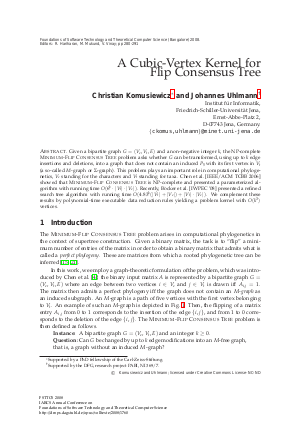A Cubic-Vertex Kernel for Flip Consensus Tree
Authors Christian Komusiewicz, Johannes Uhlmann
-
Part of:
Volume:
IARCS Annual Conference on Foundations of Software Technology and Theoretical Computer Science (FSTTCS 2008)
Part of: Series: Leibniz International Proceedings in Informatics (LIPIcs)
Part of: Conference: IARCS Annual Conference on Foundations of Software Technology and Theoretical Computer Science (FSTTCS) - License:
 Creative Commons Attribution-NonCommercial-NoDerivs 3.0 Unported license
Creative Commons Attribution-NonCommercial-NoDerivs 3.0 Unported license
- Publication Date: 2008-12-05
File

PDF
LIPIcs.FSTTCS.2008.1760.pdf
- Filesize: 442 kB
- 12 pages
Document Identifiers
Subject Classification
Keywords
- Fixed-parameter algorithm
- problem kernel
- NP-hard problem
- graph modification problem
- computational phylogenetics
Metrics
- Access Statistics
-
Total Accesses (updated on a weekly basis)
0PDF Downloads0Metadata Views
Abstract
Given a bipartite graph G=(V_c,V_t,E) and a non-negative integer k, the NP-complete Minimum-Flip Consensus Tree problem asks whether G can be transformed, using up to k edge insertions and deletions, into a graph that does not contain an induced P_5 with its first vertex in V_t (a so-called M-graph or Sigma-graph). This problem plays an important role in computational phylogenetics, V_c standing for the characters and V_t standing for taxa. Chen et al. [IEEE/ACM TCBB 2006] showed that Minimum-Flip Consensus Tree is NP-complete and presented a parameterized algorithm with running time O(6^k\cdot |V_t|\cdot |V_c|). Recently, Boecker et al. [IWPEC'08] presented a refined search tree algorithm with running time O(4.83^k(|V_t|+|V_c|) + |V_t|\cdot |V_c|). We complement these results by polynomial-time executable data reduction rules yielding a problem kernel with O(k^3) vertices.
Cite As Get BibTex
Christian Komusiewicz and Johannes Uhlmann. A Cubic-Vertex Kernel for Flip Consensus Tree. In IARCS Annual Conference on Foundations of Software Technology and Theoretical Computer Science. Leibniz International Proceedings in Informatics (LIPIcs), Volume 2, pp. 280-291, Schloss Dagstuhl – Leibniz-Zentrum für Informatik (2008)
https://doi.org/10.4230/LIPIcs.FSTTCS.2008.1760
BibTex
@InProceedings{komusiewicz_et_al:LIPIcs.FSTTCS.2008.1760,
author = {Komusiewicz, Christian and Uhlmann, Johannes},
title = {{A Cubic-Vertex Kernel for Flip Consensus Tree}},
booktitle = {IARCS Annual Conference on Foundations of Software Technology and Theoretical Computer Science},
pages = {280--291},
series = {Leibniz International Proceedings in Informatics (LIPIcs)},
ISBN = {978-3-939897-08-8},
ISSN = {1868-8969},
year = {2008},
volume = {2},
editor = {Hariharan, Ramesh and Mukund, Madhavan and Vinay, V},
publisher = {Schloss Dagstuhl -- Leibniz-Zentrum f{\"u}r Informatik},
address = {Dagstuhl, Germany},
URL = {https://drops.dagstuhl.de/entities/document/10.4230/LIPIcs.FSTTCS.2008.1760},
URN = {urn:nbn:de:0030-drops-17600},
doi = {10.4230/LIPIcs.FSTTCS.2008.1760},
annote = {Keywords: Fixed-parameter algorithm, problem kernel, NP-hard problem, graph modification problem, computational phylogenetics}
}
